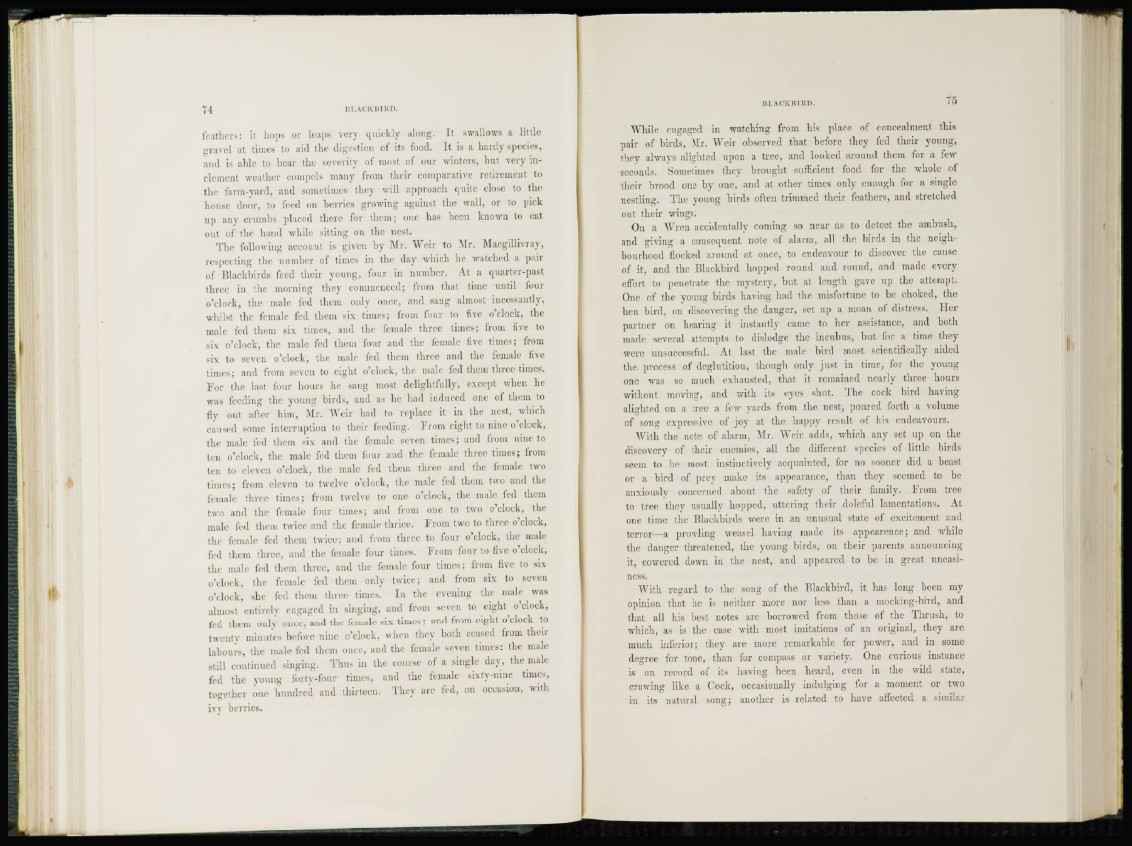
74 BL U K BIRD.
feathers: it hops or leaps very quickly along. It swallows a little
gravel at limes to aid the digestion of its food. It is a hardy species,
and is able to hear the severity of most of our winters, but very inclement
weather compels many from their comparative retirement to
the farm-yard, and sometimes they will approach quite close to the
1mMi>e door, t<> food on berries growing against the wall, or to pick
up any crumbs placed there for them; one has been known to eat
out of the hand while sitting on the nest.
The following account is given by Mr. Weir to Mr. Macgillivrav,
respecting the number of times in the day which he watched a pair
of Blackbirds feed their young, four in number. At a quarter-past
three in the morning they commenced; from that time until four
o'clock, the male fed them only once, and sang almost incessantly,
whilsi ihi female ted them s i \ times; from four to five o'clock, the
male fed them six times, and the female three times; from five to
s i \ o'clock, the male led them four and the female live times; from
six to seven o'clock, the male fed them three and the female five
times; and from seven to eight o'clock, the male fed them three times.
Tor the last four hours he sang most delightfully, except when he
was feeding the young birds, and as he had induced one of them to
tlv out after him. .Mr. Weir had to replace it in the nest, which
caused some interruption to their feeding. From eight to nine o'clock,
the male fed them six and the1 female seven times; and from nine to
ten o'clock, the male fed them four and the female three times; from
ten to eleven o'clock, the male fed them three and the female two
times; from eleven to twelve o'clock, the male fed them two and the
female three times; from twelve to one o'clock, the male fed them
two and the female four times; and from one to two o'clock, the
male fed them twice and the female thrice. From t wo to three o'clock,
the female fed them twice; and from three to four o'clock, the male
fed them three, and the female four times. from four to five o'clock,
the male fed them three, and the female four times; from five to six
o'clock, the female fed them only twice; and from six to seven
o'clock, she fed them three times. In the evening the male was
almost entirely engaged in singing, and from sei en to eight o'clock,
fed them only once, and the female six times; and from eight o'clock to
twent) minutes before nine o'clock, when they both ceased from thenlabours,
the male fed them once, and the female seven times: the male
still continued singing. Thus in the course of a single day, the male
fed the young forty-four times, and the female sixty-nine times,
together one hundred and thirteen. They are fed, on occasion, with
ivv berries.
While engaged in watching from his place of concealment this
pair of birds, Mr. WTeir observed that before they fed their young,
they always alighted upon a tree, and looked around them for a few
seconds. Sometimes they brought sufficient food for the whole of
their brood one by one, and at other times only enough for a single
nestling. The young birds often trimmed their feathers, and stretched
out their wings.
On a Wren accidentally coming so near as to detect the ambush,
and giving a consequent note of alarm, all the birds in the neighbourhood
flocked around at once, to endeavour to discover the cause
of it, and the Blackbird hopped round and round, and made every
effort to penetrate the mystery, but at length gave up the attempt.
One of the young birds having had the misfortune to be choked, the
hen bird, on discovering the danger, set up a moan of distress. Her
partner on hearing it instantly came to her assistance, and both
made several attempts to dislodge the incubus, but for a time they
were unsuccessful. At last the male bird most scientifically aided
the process of deglutition, though only just in time, for the young
one was so much exhausted, that it remained nearly three hours
without moving, and with its eyes shut. The cock bird having
alighted on a tree a few yards from the nest, poured forth a volume
of song expressive of joy at the happy result of his endeavours.
With the note of alarm, Mr. Weir adds, which any set up on the
discovery of their enemies, all the different species of little birds
seem to be most instinctively acquainted, for no sooner did a beast
or a bird of prey make its appearance, than they seemed to he
anxiously concerned about the safety of their family. From tree
to tree they usually hopped, uttering their doleful lamentations. At
one time the Blackbirds were in an unusual state of excitement and
terror—a prowling weasel having made its appearence; and while
the danger threatened, the young birds, on their parents announcing
it, cowered down in the nest, and appeared to be in great uneasiness.
V* ith regard to the song of the Blackbird, it has long been my
opinion that he is neither more nor less than a mocking-bird, and
that all his best notes are borrowed from those of the Thrush, to
which, as is the case with most imitations of an original, they are
much inferior; they are more remarkable for power, and in some
degree for tone, than for compass or variety. One curious instance
is on record of its having been heard, even in the wild state,
crowing like a Cock, occasionally indulging for a moment or two
in its natural song; another is related to have affected a similar